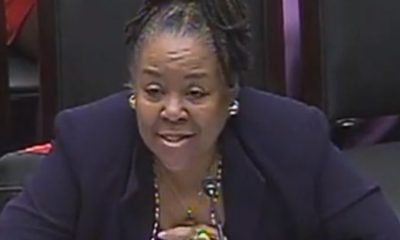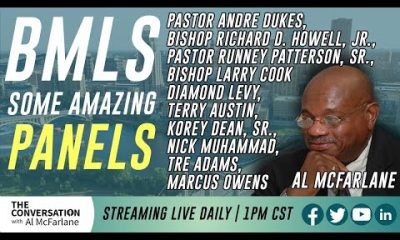#NNPA BlackPress
IN MEMORIAM: Garth C. Reeves, Sr., Retired Miami Times Publisher, Dies
CHICAGO CRUSADER — Regarded as a titan in the Black Press, Reeves was widely respected in Miami for using his power and influence to advance the agenda of the city’s Black community. After experiencing the pain and humiliation of segregation in parks, schools and the U.S. military, Reeves grew into an uncompromising crusader who smashed racial barriers in some of the most prominent organizations in Miami and the nation.
By Erick Johnson, Chicago Crusader

Garth C. Reeves, Sr., The Miami Times’ retired publisher who became the enduring patriarch of a family newspaper dynasty after decades of fighting the political establishment and while guiding the Black community through the city’s racial problems, died on Monday, November 25. He was 100.
Regarded as a titan in the Black Press, Reeves was widely respected in Miami for using his power and influence to advance the agenda of the city’s Black community. After experiencing the pain and humiliation of segregation in parks, schools and the U.S. military, Reeves grew into an uncompromising crusader who smashed racial barriers in some of the most prominent organizations in Miami and the nation.
During his lifetime, Reeves’ newspaper got a police chief fired, ended the career of a a Miami Mayoral, supported a boycott that cost Miami Beach’s tourism industry millions, and unapologetically called riots “protests” or rebellions. He stared down Miami’s political establishment that for decades had been accused of shutting out Blacks in government as Hispanics rose to power in the city’s political and business establishments.

He urged his journalists to write from a Black perspective, one that saw the struggle through a different lens than white newspapers.
His newspaper career spanned at least eight decades. At the height of Reeves’ leadership, The Miami Times earned the name, “The Voice of Miami’s Black Community.” One of the last great Black publishers, Reeves’ death closes a significant chapter in The Miami Times’ illustrious history.
Reeves was born February 12, 1919 in Nassau, Bahamas. That same year, Reeves’ father, Harry Ethelbert Sigismund Reeves, moved to Miami where he founded the Magic Printing Company in Overtown, the city’s historic Black, once-thriving neighborhood near downtown. Harry Ethelbert Sigismund Reeves in 1920 founded the Miami Sun, which closed because of a paper shortage during World War I. In 1923, The Miami Times was founded. Reeves was just four years old.
Garth C. Reeves, Sr. was among many Blacks who attended Miami’s esteemed Booker T. Washington Senior High School, the city’s oldest predominately Black high school that was built when students of color were not accepted at white public schools. Black students at Booker T. were given secondhand text books and football gear that came from white schools.

In 1923, Harry Reeves started The Miami Times at NW 8th Street and 3rd Avenue. It would move four more times in the Overtown neighborhood. When Interstate-95 was built through Overtown, it displaced thousands of Blacks. Many fled north to the Liberty City community, where The Miami Times sits at its present location, 900 NW 54 Street.
In 1940, Reeves graduated from Florida A&M University, a major, historically Black school in Tallahassee, FL. In 1942, Reeves was drafted to serve in the Army during World War II. During an interview in 1999, Reeves recalled a trip on a train to the Pacific coast to go overseas. Despite repeated requests, a white train conductor refused to give Reeves something to eat in spite of him having meal coupons. Reeves went to the military police, who told him to do what the white conductor said, or face being locked up on the train. Reeves was forced to pay for his meal because he could not go into the segregated dining car.
Experiences like those would fuel Reeves’ passion for Black journalism’s role in exposing racial injustices while advocating for the needs of disenfranchised people of color.
After completing his service in 1946, Reeves returned to The Miami Times. By then, Blacks could not sit at segregated diners downtown. Members of the Klu Klux Klan would often parade through Miami’s bustling downtown. Parks and schools did not accept Blacks either and living conditions among Blacks worsened as slums in Overtown increased.
Reeves joined Reverend Theodore Gibson, the president of the local NAACP Chapter and began leading protests for better conditions for Blacks in Miami. Out of 28 beaches, only Virginia Key Beach was open to Blacks. On November 7, 1957, Reeves led a group of seven Black leaders to Crandon Park, a segregated white beach near Miami. Reeves and the men earlier talked to several county commissioners, saying that as taxpayers they had the right to frequent Crandon Park or any segregated beach. Wearing their bathing suits under their clothes, Reeves and the men took off their slacks and went into the water while several police officers watched. Blacks began frequenting other white beaches after the incident.
Blacks were not allowed to play at city-owned golf-courses in the 1940s. But that changed when Reeves and Gibson filed a lawsuit that went all the way to the U.S. Supreme Court. In a landmark case, Rice v. City of Miami, the Supreme Court ruled that the city could not continue accepting tax money to build and maintain golf courses while denying its use to all residents.
In an interview on the History Miami Museum website, Reeves recalled an experience he had when Dr. Martin Luther King came to Miami during the Civil Rights Movement.
“When Martin Luther King came down, I attended some of his meetings. My friend was a good friend of King’s and I used to attend meetings where he would preach to us about nonviolence. I remember talking to Martin a few times and I said, “Martin, you really believe that if I was somewhere and a white guy spat on my face, you think I would walk away from that? I said I’d try and kill that son of a b—-. He said, ‘That’s why you’ve got to try to learn to control yourself.’ I liked him.”
That was Reeves the activist.

Reeves, as the publisher of The Miami Times, was just as fierce. It was the only job Reeves would have throughout his life. He worked his way up the ranks as columnist, reporter, managing editor, and editor. When Reeves’ father died in 1970, Reeves became publisher.
By then The Miami Times had established itself as the Black newspaper of record.
During the 1960s The Miami Times ran a front-page story advocating for the termination of Miami Police Chief Walter Headly, whose Stop and Frisk policy of searching Blacks lit up racial tensions in the city. Headly was eventually fired and the Times readership grew.
When four Miami police officers were acquitted in May, 1980 of killing Arthur McDuffie, a Black salesman, Blacks took to the streets. White newspapers and local television stations described it as a riot. With Reeves at the helm, The Miami Times called the incident a “protest.” When another Miami police officer was acquitted in 1993 for killing two Black motorists in Overtown, The Miami Times called the civil unrest a rebellion.
There were other highlights under Reeves’ leadership at The Miami Times.
In 1985, Mayor Maurice Ferre lost the Black vote and was defeated in his re-election bid after The Miami Times ran a series of editorials criticizing the mayor for firing Howard Gary, Miami’s first Black city manager.
In 1993, Reeves and The Miami Times published editorials and stories supporting a boycott of Miami Beach hotels that cost the tourism industry millions of dollars.
Black leaders accused county leaders of snubbing Nelson Mandela after they withdrew plans to give him a proclamation and key to the city when the anti-apartheid leader publicly expressed his support for Cuban Dictator Fidel Castro.
The National Bar Association and ACLU were among many organizations that did not bring their conventions to Miami Beach in support of the boycott.
The boycott lasted three years and cost the tourism industry between $20 to $50 million. Mandela was given an official proclamation and the hotel industry implemented programs to boost Blacks in its facilities. Miami Beach got its first Black-owned luxury hotel, the Royal Palm Crowne Plaza.
“It was important that we had a communication outlet to get our message out,” said H.T. Smith, a prominent Miami attorney who spearheaded the boycott. “The mainstream media would not give us any coverage. The Miami Times was essential to the boycott’s success. The boycott would not have been successful without The Miami Times. And our friendship grew as a result of this partnership.”
Former Miami Times executive editor Mohamad Hamaludin, who worked for 15 years at the newspaper, said, “Reeves was a fine gentleman. By the time I got to The Miami Times, he and the staff had already established it as a voice for people who didn’t have a voice.”
Reeves was the first Black to serve on the boards of the Miami-Dade College, Barry University, the Greater Miami Chamber of Commerce, and the United Way of Dade County. He also served as organizing chairman of the board for National Industrial Bank, which was the first integrated bank in the State of Florida.
While serving on many of these boards, Reeves pushed them to hire more Blacks when they were reluctant to do so. As a board member of Miami-Dade College, Reeves threatened to lead a vote to stop doing business with the school’s law firm because it resisted his calls to hire Black attorneys in its offices.
Reeves assisted Crusader Publisher Dorothy R. Leavell in bringing the NNPA Annual Convention to Gary in 1983 after Black political power gained a foothold in the Steel City.
“He believed in the Black Press very deeply,” said Leavell who first met Reeves in 1962. “Whatever he did, he was always on the right side of the battle. He remained a forward thinker to the very end. He was truly one of the last of the great Black publishers from the old school in the Black Press.”
Today, The Miami Times is the oldest and largest Black newspaper in the Southeast. For the past two years it has been named Best Black Newspaper by the National Newspaper Publishers Association (NNPA), which represents over 200 Black newspapers across the country. In 2011, NNPA named Reeves Publisher of the Year. In 2017, Reeves was inducted into the National Association of Black Journalists Hall of Fame.
In 2017, Miami recognized Reeves with an honorary street sign at 6 Street and NW 2 Avenue near the Black Archives History and Research Foundation of South Florida where he was a board member.
Reeves was a life member of the National Association for the Advancement of Colored People, Sigma Pi Phi Fraternity, Inc., Omega Psi Phi Fraternity, Inc., and a founding member of the Episcopal Church of the Incarnation in Miami, Florida.
He was awarded honorary doctorate degrees from the University of Miami, Barry University and Florida Memorial University.
For years, Reeves had provided scholarships to aspiring journalism students at his high school alma mater, Booker T. Washington.
Reeves served for 10 years as president of the Amalgamated Publishers Inc. in New York City, which represented over one hundred African American-owned newspapers throughout the United States. He was also elected to serve two terms as president of the National Newspaper Publishers Association.
He retired in 1994 and assumed the role of publisher emeritus but Reeves remained active as a prominent leader in the Black community.
Reeves outlived both of his children. In 1982, Reeves’ son, Garth C. Reeves, Jr., died of colon cancer when just 30 years old. This past September, Reeves’ daughter, Rachel died at 68. His grandson, Garth Basil Reeves now heads the family newspaper dynasty at just 29.
This article originally appeared in The Chicago Crusader.
#NNPA BlackPress
IN MEMORIAM: Ramona Edelin, Influential Activist and Education Advocate, Dies at 78
NNPA NEWSWIRE — Born on September 4, 1945, in Los Angeles, California, activist Ramona Edelin’s early years were marked by a commitment to education and social justice. According to her HistoryMakers biography, after graduating from Fisk University with a Bachelor’s degree in 1967, she pursued further studies at the University of East Anglia in England. She earned her master’s degree before completing her Ph.D. at Boston University in 1981.
The post IN MEMORIAM: Ramona Edelin, Influential Activist and Education Advocate, Dies at 78 first appeared on BlackPressUSA.

By Stacy M. Brown, NNPA Newswire Senior National Correspondent
@StacyBrownMedia
Once upon a time, Black Americans were simply known as colored people, or Negroes. That is until Ramona Edelin came along. The activist, renowned for her pivotal roles in advancing civil rights, education reform, and community empowerment, died at her D.C. residence last month at the age of 78. Her death, finally confirmed this week by Barnaby Towns, a communications strategist who collaborated with Dr. Edelin, was attributed to cancer.
Born on September 4, 1945, in Los Angeles, California, Edelin’s early years were marked by a commitment to education and social justice. According to her HistoryMakers biography, after graduating from Fisk University with a Bachelor’s degree in 1967, she pursued further studies at the University of East Anglia in England. She earned her master’s degree before completing her Ph.D. at Boston University in 1981.
Edelin’s contributions to academia and activism were manifold. She was pivotal in popularizing the term “African American” alongside Rev. Jesse L. Jackson in the late 1980s.
Jackson had announced the preference for “African American,” speaking for summit organizers that included Dr. Edelin. “Just as we were called Colored, but were not that, and then Negro, but not that, to be called Black is just as baseless,” he said, adding that “African American” “has cultural integrity” and “puts us in our proper historical context.”
Later, Edelin told Ebony magazine, “Calling ourselves African Americans is the first step in the cultural offensive,” while linking the name change to a “cultural renaissance” in which Black Americans reconnected with their history and heritage.
“Who are we if we don’t acknowledge our motherland?” she asked later. “When a child in a ghetto calls himself African American, immediately he’s international. You’ve taken him from the ghetto and put him on the globe.”
The HistoryMakers bio noted that Edelin’s academic pursuits led her to found and chair the Department of African American Studies at Northeastern University, where she established herself as a leading voice.
Transitioning from academia to advocacy, Edelin joined the National Urban Coalition in 1977, eventually ascending to president and CEO. During her tenure, she spearheaded initiatives such as the “Say Yes to a Youngster’s Future” program, which provided crucial support in math, science, and technology to youth and teachers of color in urban areas. Her biography noted that Edelin’s efforts extended nationwide through partnerships with organizations like the National Science Foundation and the United States Department of Education.
President Bill Clinton recognized Edelin’s expertise by appointing her to the Presidential Board on Historically Black Colleges and Universities in 1998. She also co-founded and served as treasurer of the Black Leadership Forum, solidifying her standing as a respected leader in African American communities.
Beyond her professional achievements, Edelin dedicated herself to numerous boards and committees, including chairing the District of Columbia Educational Goals 2000 Panel and contributing to the Federal Advisory Committee for the Black Community Crusade for Children.
Throughout her life, Edelin received widespread recognition for her contributions. Ebony magazine honored her as one of the 100 Most Influential Black Americans, and she received prestigious awards such as the Southern Christian Leadership Award for Progressive Leadership and the IBM Community Executive Program Award.
The post IN MEMORIAM: Ramona Edelin, Influential Activist and Education Advocate, Dies at 78 first appeared on BlackPressUSA.
#NNPA BlackPress
Tennessee State University Board Disbanded by MAGA Loyalists as Assault on DE&I Continues
NNPA NEWSWIRE — Recent legislative actions in Tennessee, such as repealing police reform measures enacted after the killing of Tyre Nichols, underscore a troubling trend of undermining local control and perpetuating racist agendas. The new law preventing local governments from restricting police officers’ authority disregards community efforts to address systemic issues of police violence and racial profiling.
The post Tennessee State University Board Disbanded by MAGA Loyalists as Assault on DE&I Continues first appeared on BlackPressUSA.

By Stacy M. Brown, NNPA Newswire Senior National Correspondent
@StacyBrownMedia
Tennessee State University (TSU), the state’s only public historically Black college and university (HBCU), faces a tumultuous future as Gov. Bill Lee dissolved its board, a move supported by racist conservatives and MAGA Republicans in the Tennessee General Assembly, who follow the lead of the twice-impeached, four-times indicted, alleged sexual predator former President Donald Trump. Educators and others have denounced the move as an attack on diversity, equity, and inclusion (DE&I) and a grave setback for higher education.
Critics argue that TSU’s purported financial mismanagement is a manufactured crisis rooted in decades of underinvestment by the state government. They’ve noted that it continues a trend by conservatives and the racist MAGA movement to eliminate opportunities for Blacks in education, corporate America, and the public sector.
Gevin Reynolds, a former speechwriter for Vice President Kamala Harris, emphasizes in an op-ed that TSU’s financial difficulties are not the result of university leadership because a recent audit found no evidence of fraud or malfeasance.
Reynolds noted that the disbanding of TSU’s board is not an isolated incident but part of a broader assault on DE&I initiatives nationwide. Ten states, including Tennessee, have enacted laws banning DE&I policies on college campuses, while governors appointing MAGA loyalists to university trustee positions further undermine efforts to promote inclusivity and equality.
Moreover, recent legislative actions in Tennessee, such as repealing police reform measures enacted after the killing of Tyre Nichols, underscore a troubling trend of undermining local control and perpetuating racist agendas. The new law preventing local governments from restricting police officers’ authority disregards community efforts to address systemic issues of police violence and racial profiling.
The actions echo historical efforts to suppress Black progress, reminiscent of the violent backlash against gains made during the Reconstruction era. President Joe Biden warned during an appearance in New York last month that Trump desires to bring the nation back to the 18th and 19th centuries – in other words, to see, among other things, African Americans back in the chains of slavery, women subservient to men without any say over their bodies, and all voting rights restricted to white men.
The parallels are stark, with white supremacist ideologies used to justify attacks on Black institutions and disenfranchise marginalized communities, Reynolds argued.
In response to these challenges, advocates stress the urgency of collective action to defend democracy and combat systemic racism. Understanding that attacks on institutions like TSU are symptomatic of broader threats to democratic norms, they call for increased civic engagement and voting at all levels of government.
The actions of people dedicated to upholding the principles of inclusivity, equity, and justice for all will determine the outcome of the ongoing fight for democracy, Reynolds noted. “We are in a war for our democracy, one whose outcome will be determined by every line on every ballot at every precinct,” he stated.
The post Tennessee State University Board Disbanded by MAGA Loyalists as Assault on DE&I Continues first appeared on BlackPressUSA.
#NNPA BlackPress
Braxton Haulcy and the Expansion of Walker|West Music Academy
May 24, 2023 – Walker West Music Academy gets an early start on expansion. Join us for a Wednesday episode of The …
The post Braxton Haulcy and the Expansion of Walker|West Music Academy first appeared on BlackPressUSA.

May 24, 2023 – Walker West Music Academy gets an early start on expansion. Join us for a Wednesday episode of The …
The post Braxton Haulcy and the Expansion of Walker|West Music Academy first appeared on BlackPressUSA.
-

 Activism4 weeks ago
Activism4 weeks agoOakland Post: Week of March 27 – April 2, 2024
-

 #NNPA BlackPress4 weeks ago
#NNPA BlackPress4 weeks agoBeloved Actor and Activist Louis Cameron Gossett Jr. Dies at 87
-

 Community1 week ago
Community1 week agoFinancial Assistance Bill for Descendants of Enslaved Persons to Help Them Purchase, Own, or Maintain a Home
-

 Activism3 weeks ago
Activism3 weeks agoOakland Post: Week of April 3 – 6, 2024
-

 Business1 week ago
Business1 week agoV.P. Kamala Harris: Americans With Criminal Records Will Soon Be Eligible for SBA Loans
-

 Activism2 weeks ago
Activism2 weeks agoOakland Post: Week of April 10 – 16, 2024
-

 Community1 week ago
Community1 week agoAG Bonta Says Oakland School Leaders Should Comply with State Laws to Avoid ‘Disparate Harm’ When Closing or Merging Schools
-

 Community6 days ago
Community6 days agoOakland WNBA Player to be Inducted Into Hall of Fame


























































